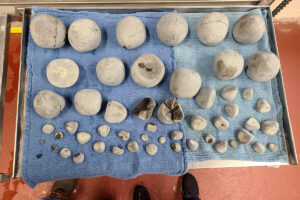Prehistoric Horse Skeleton Unearthed in France
- Topics: Article
The full skeleton of a horse that lived in France 100,000 years ago has been discovered in the volcanic region of Auvergne, according to several French news sources including the French Press Agency (AFP).
The prehistoric animal's bones are in a "perfect state of preservation," which makes this a truly "exceptional" find, said the AFP's source, Frédéric Surmely, curator of Auvergne's Regional Direction of Cultural Affairs (DRAC) archaeology department, which announced the discovery on Nov. 16. "The skeleton is complete, including the small bones and the caudal vertebrae (the tail bones)."
Farmer Jean-Charles Tixidre accidentally made the discovery Oct. 10 and immediately contacted the DRAC, the AFP reported. The horse's bones were about six feet underground in a field near the popular tourist site Puy-de-Dôme, an extinct volcano. Tixidre struck the horse's skull with his tractor when moving sand, according to La Montagne.
The first photos of the unearthed skeleton, released online Nov. 16, show a full set of whole bones still aligned in skeletal position. Probably an ancestor of the modern horse, this prehistoric mammal measured about 13.2 hands and "looks somewhat like a big pony," Surmely said
Create a free account with TheHorse.com to view this content.
TheHorse.com is home to thousands of free articles about horse health care. In order to access some of our exclusive free content, you must be signed into TheHorse.com.
Start your free account today!
Already have an account?
and continue reading.

Related Articles
Stay on top of the most recent Horse Health news with

















